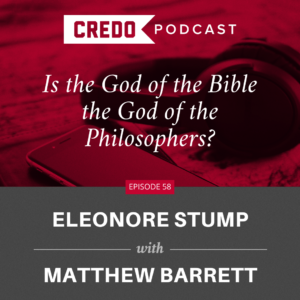Show Notes
It is not uncommon to hear some Christians today pit the God of the Bible against the “god of the philosophers.” It is assumed that the philosophers reasoned their way to a cold, inert, static, indifferent, and impersonal Being who resembles little the loving, covenant-making God of the Bible. They are distinct, and never the two shall meet. What God has torn asunder, let no man bring together. But is this dichotomy a fair one? In this episode of the Credo Podcast, Matthew Barrett talks to philosopher Eleonore Stump who pushes back against this common caricature. Stump looks to a prophet like Jonah to show that the classical attributes of God do not undermine but actually undergird God’s redeeming presence. Stump also introduces Thomas Aquinas, the most significant representative of the philosophers, and reveals that Thomas the Philosopher is none other than Thomas the Bible Teacher.
 Eleonore Stump is the Robert J. Henle Professor of Philosophy at Saint Louis University. She is Honorary Professor at Wuhan University and at the Logos Institute, St. Andrews, and a Professorial Fellow at Australian Catholic University. She has published extensively in philosophy of religion, contemporary metaphysics, and medieval philosophy. Her books include Aquinas (2003), Wandering in Darkness: Narrative and the Problem of Suffering (2010), and Atonement (2018).
Eleonore Stump is the Robert J. Henle Professor of Philosophy at Saint Louis University. She is Honorary Professor at Wuhan University and at the Logos Institute, St. Andrews, and a Professorial Fellow at Australian Catholic University. She has published extensively in philosophy of religion, contemporary metaphysics, and medieval philosophy. Her books include Aquinas (2003), Wandering in Darkness: Narrative and the Problem of Suffering (2010), and Atonement (2018).
Matthew Barrett is Associate Professor of Christian Theology at Midwestern Baptist Theological Seminary, as well as the founder and executive editor of Credo Magazine. He is the author of several books, including Canon, Covenant and Christology: Rethinking Jesus and the Scriptures of Israel; None Greater: The Undomesticated Attributes of God; 40 Questions About Salvation; God’s Word Alone: The Authority of Scripture; Reformation Theology: A Systematic Summary; Salvation by Grace, and Owen on the Christian Life. He is the host of the Credo podcast where he engages top theologians on the most important theological issues today.
